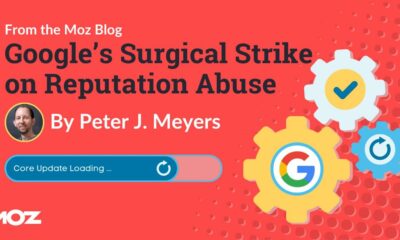MARKETING
How To Adapt Your SEO and Content Strategies for SGE and AI Experiences
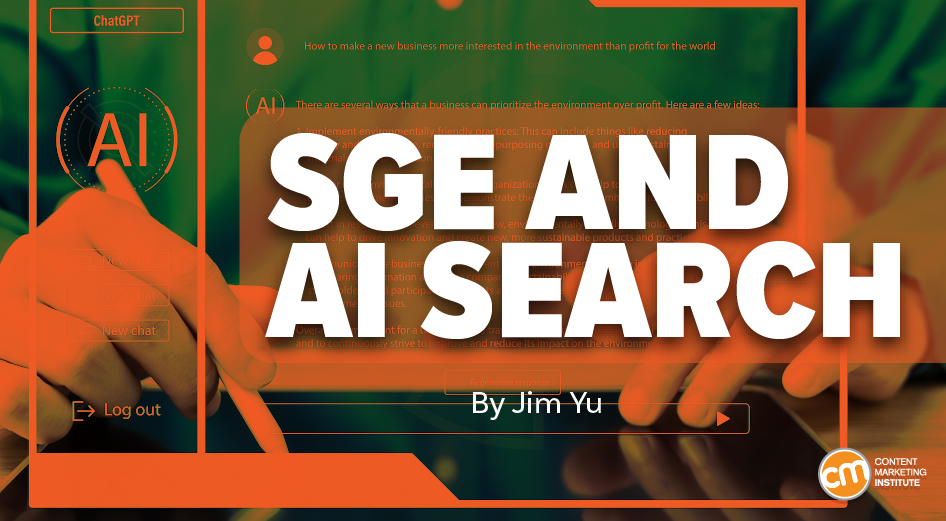
A massive change is coming to search.
As Google experiments with AI in its standard search results and its Search Generative Experience (SGE), marketers must understand how to adapt their content strategies for new AI-impacted search experiences.
Since 2023, Google has been prolific in its AI experimentation, changing the way content is represented in search results. Its content-led SGE recently moved out of its testing lab to show up in a small percentage of results in Google’s main search interface.
Brands that produce content experiences that align with new search behaviors and focus on conversion stand a better chance to survive the search change.
Google adds generative AI, first-person reviews, and anti-spam actions
Your news feed says all. Search and generative AI investments are everywhere. And it’s not just Google — new entrants, such as Perplexity AI and You.com, are on the search scene. Meanwhile, OpenAI is working on a search engine powered by Microsoft’s Bing.
Still, Google owns the biggest market share in search, so let’s focus on the ways AI is affecting Google SEO.
Reddit and new content sources
Google added new content sources to its traditional results and Search Generative Experience.
In traditional search results, adding more content sources helps fine-tune its AI technologies. The recent content licensing deal with Reddit is a prime example. You can already see its content appearing more often in traditional search results.
This screenshot shows the search engine results for “Is Volvo a good car?” A discussion from the Volvo subreddit appears as the third result on the page (or fourth if you count the people-also-ask module.)
Click to enlarge
SGE appearance
The image below shows the SGE for the Volvo query. The first paragraphs are an AI-generated summary drawing on ratings from RepairPal (after an alert explaining the experimental nature of the generative AI content.)
Below the SGE summary, a search box prompts the visitor to ask a follow-up question. After that element, the Reddit discussion on Volvo reliability appears.
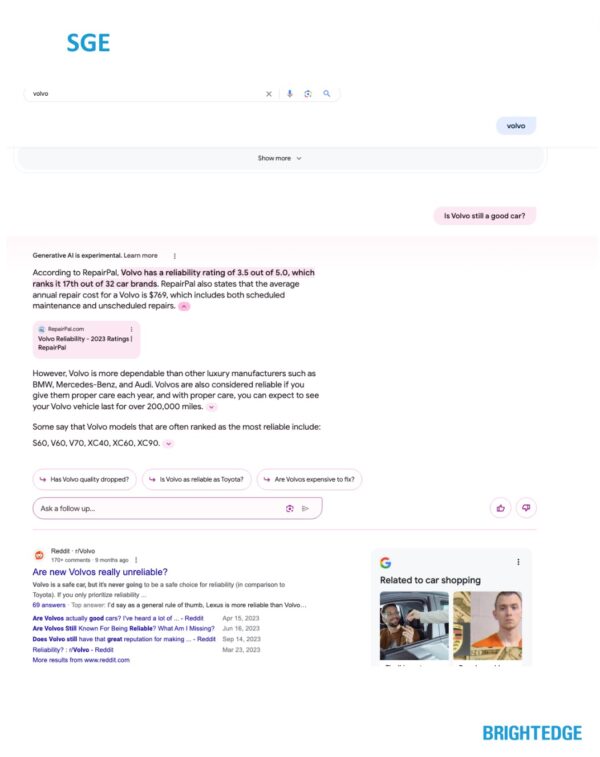
Click to enlarge
Showing Reddit content in SERPs lets Google show more first-person reviews and opinions (the experience element of Google’s EEAT (experience, expertise, authoritativeness, and trustworthiness) for search ratings.
But how will Google distinguish between subjective, objective, and informative opinions? With Reddit content, which can include positive and negative opinions readily on display, brands will need to follow relevant discussions on Reddit.
Google goes after spam sites
You may have read about Google’s latest update, which aims to avoid sites with low-quality (often AI-generated) content and give helpful content more prominence in SERPs.
This hammers home the message to avoid relying on generative AI alone for content creation. Content needs a human touch to earn the experience, expertise, authoritativeness, and trustworthiness that Google and, more importantly, searchers want to see.
Expect more penalties from Google for content that’s just churned out from AI prompts.
SGE’s impact on brands
SGE is the rollout that will impact every industry and content marketer.
My company, BrightEdge, built a tool to detect how and where search engines experiment with AI and new content formats. The chart below shows an estimate of the percentage of queries by industry affected by SGE results once it’s fully rolled out.
Health care will see the biggest impact, with 76% of its searches affected by SGE. Finance will be the least affected, with only 17% of queries impacted by SGE. Here’s how SGE will affect other industries:
- E-commerce (49%)
- B2B technology (48%)
- Insurance (45%)
- Education (44%)
- Restaurants (36%)
- Entertainment (36%)
- Travel (30%)

Click to enlarge
Once SGE rolls out completely, it will likely impact over $40 billion per year in ad revenue on Google for marketers per BrightEdge estimates.
How to prepare for SGE and changing search behavior
Google has always shown relevant sources and articles so searchers can make informed decisions. With the generative AI changes, Google’s engine now asserts an opinion. This represents a fundamental shift in how a search engine responds to queries.
Imagine you search the web to learn more about a BMW model you’re interested in. Previously, a Google search would display results with links such as BMW’s official site, Top Gear, Consumer Reports, and Carfax. The searcher then could choose the resources to explore and form an opinion about the vehicle.
In the generative AI world, Google’s primary result might not be a direct link to BMW’s website. Instead, it could be AI-generated content that provides an evaluative perspective. The AI content might include important factors to consider when looking at a BMW, such as the potential for high maintenance expenses or issues with parts availability due to supply chain challenges. This AI-curated summary will be presented before the searcher can see the resources with links for further exploration.
This shift may lead to reduced but higher-quality traffic. Brands are likely to experience better conversion rates. The reason? Consumers are more likely to act because they’ve been influenced by prior engagements and information provided by Google.
Still, you’ll need to adapt to the new search environment. Here are some tips on how to prepare.
Focus on the search basics
Solidify your foundation of SEO and website fundamentals. The essential elements will gain more significance as time progresses.
Make sure your website is optimized for user-friendliness and complies with Google’s guidelines regarding Core Web Vitals, Helpful Content, and EEAT (experience, expertise, authoritativeness, trustworthiness).
You may also want to review these tips for optimizing content for SGE.
Deepen your understanding of new search behaviors
Use data to grasp user and conversational intent, especially since these factors influence the AI-generated search results. Identifying high-value searches is essential.
Make sure that your content responds to the specific query and addresses its broader context to attract results for long-tail keyword searches.
Content generated by AI draws from reliable and credible sources. Ensure your brand’s content is considered an authoritative source.
The growing prominence of trusted sources and an increase in consumer reviews signal a pivotal change: Brands are likely to have less control over the customer journey.
Align content with other marketing disciplines
Search engine results now encompass an array of media types and formats, including social media, reviews, and news sources. So, teams in marketing, content creation, digital strategies, brand management, design, social media, and public relations must align closely.
Strategies for an AI-first future
According to BrightEdge research, 98% of enterprise organizations say they’ll prioritize SEO in 2024. And 94% of organizations are looking to integrate SEO into all marketing (omnichannel) strategies.
Strategies for adapting your content approach to new search experiences will vary by industry. Here are a few examples.
E-commerce: Google commonly presents content for e-commerce queries via product viewers. SGE replaces these with better, more visual, and informational (combined) content.
Google has experimented with several formats, including a general shopping result that details what a searcher would expect to see in a universal listing. However, as SGE results have evolved, so have the ways a user can view products.
This image shows an example of SGE’s integrated product viewer carousel with grouping for apparel, which displays multiple apparel options in a single display.

These tips will help you prepare for the various viewer modules (see viewer examples).
- Optimize for trend relevance: Aligning category pages with current trends can increase your chance of being included in SGE dynamic displays.
- Incorporate product reviews: Showing product reviews on your site boosts credibility.
- Present clear pricing Information: Use schema markup to highlight pricing details.
Travel, restaurants, and local: Places have long been a key module for Google. Now, we’re seeing the places module showing up in about 45% of SGE queries. So, make sure to include location-based keywords.
You might also try these optimization suggestions:
- Monitor and respond to reviews.
- Tailor your local listings for location-specific queries.
- Keep an eye on how and where SGE displays local modules. SGE displays local results even in queries without location-specific terms.
Entertainment: SGE entertainment results are primarily informational. But more reviews (and warnings for age-appropriate content) are appearing in both traditional search and SGE.
Get ready to shift your SEO thinking
Whoever provides the best experience for their target consumers will win in the new AI search experiences. Focus on third-party content reviews, social, PR, and brand authority. Expect your competitive landscape to change with new entrants that might eat into your market share.
Be aware, ready, and prepared to optimize for multiple AI search experiences.
All tools mentioned in this article were suggested by the author. If you’d like to suggest a tool, share the article on social media with a comment.
HANDPICKED RELATED CONTENT:
Cover image by Joseph Kalinowski/Content Marketing Institute
MARKETING
Google’s Surgical Strike on Reputation Abuse
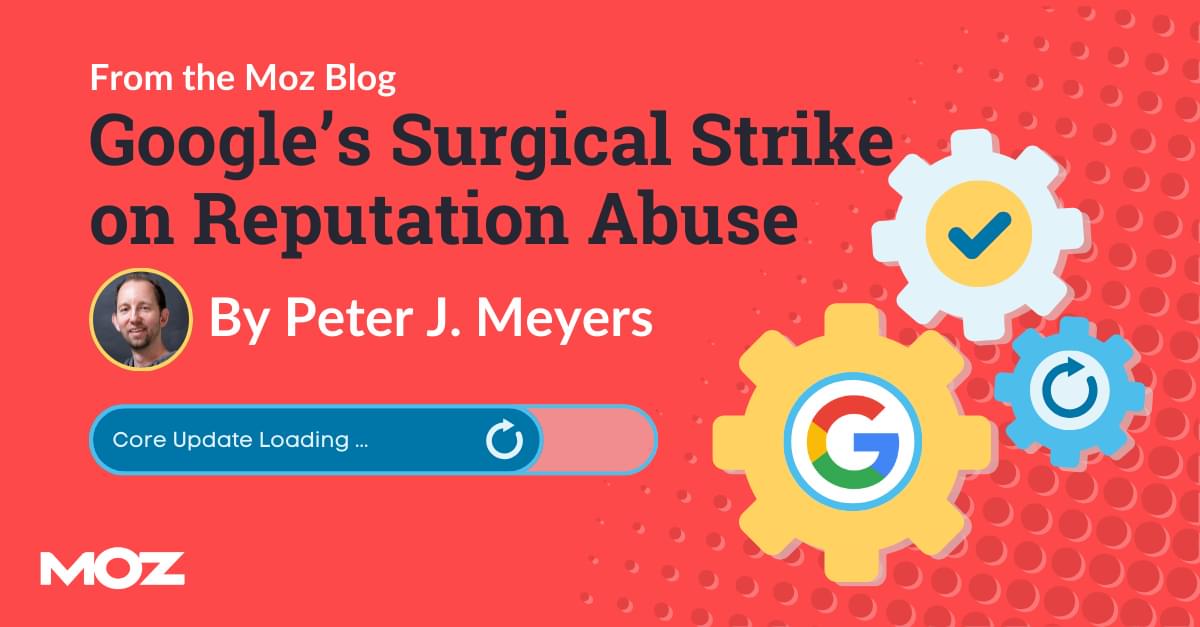
These aren’t easy questions. On the one hand, many of these sites do clearly fit Google’s warning and were using their authority and reputation to rank content that is low-relevance to the main site and its visitors. With any punitive action, though, the problem is that the sites ranking below the penalized sites may not be of any higher quality. Is USA Today’s coupon section less useful than the dedicated coupon sites that will take its place from the perspective of searchers? Probably not, especially since the data comes from similar sources.
There is a legitimate question of trust here — searchers are more likely to trust this content if it’s attached to a major brand. If a site is hosting third-party content, such as a coupon marketplace, then they’re essentially lending their brand and credibility to content that they haven’t vetted. This could be seen as an abuse of trust.
In Google’s eyes, I suspect the problem is that this tactic has just spread too far, and they couldn’t continue to ignore it. Unfortunately for the sites that were hit, the penalties were severe and wiped out impacted content. Regardless of how we feel about the outcome, this was not an empty threat, and SEOs need to take Google’s new guidelines seriously.
MARKETING
18 Events and Conferences for Black Entrepreneurs in 2024

Welcome to Breaking the Blueprint — a blog series that dives into the unique business challenges and opportunities of underrepresented business owners and entrepreneurs. Learn how they’ve grown or scaled their businesses, explored entrepreneurial ventures within their companies, or created side hustles, and how their stories can inspire and inform your own success.
It can feel isolating if you’re the only one in the room who looks like you.
MARKETING
IAB Podcast Upfront highlights rebounding audiences and increased innovation
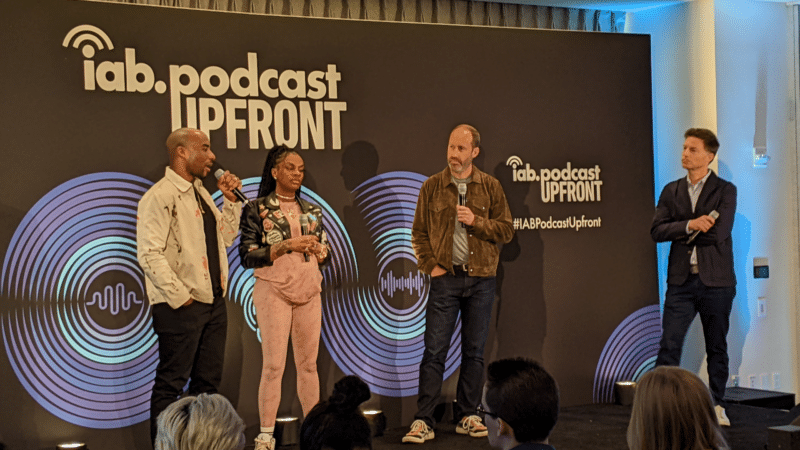
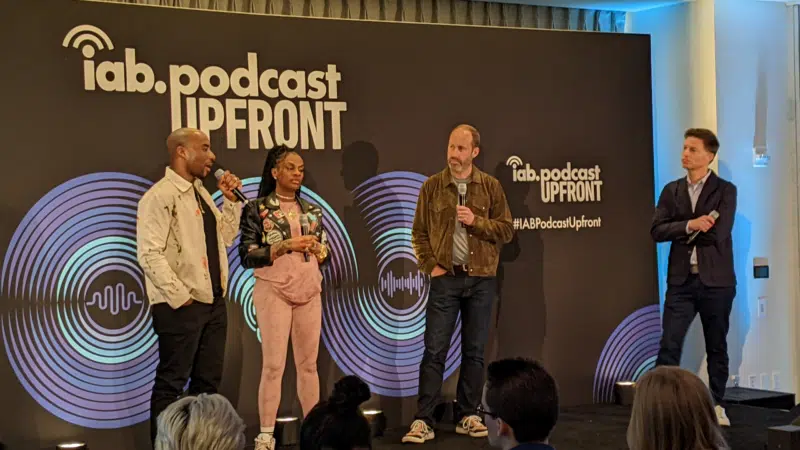
Podcasts are bouncing back from last year’s slowdown with digital audio publishers, tech partners and brands innovating to build deep relationships with listeners.
At the IAB Podcast Upfront in New York this week, hit shows and successful brand placements were lauded. In addition to the excitement generated by stars like Jon Stewart and Charlamagne tha God, the numbers gauging the industry also showed promise.
U.S. podcast revenue is expected to grow 12% to reach $2 billion — up from 5% growth last year — according to a new IAB/PwC study. Podcasts are projected to reach $2.6 billion by 2026.
The growth is fueled by engaging content and the ability to measure its impact. Adtech is stepping in to measure, prove return on spend and manage brand safety in gripping, sometimes contentious, environments.
“As audio continues to evolve and gain traction, you can expect to hear new innovations around data, measurement, attribution and, crucially, about the ability to assess podcasting’s contribution to KPIs in comparison to other channels in the media mix,” said IAB CEO David Cohen, in his opening remarks.
Comedy and sports leading the way
Podcasting’s slowed growth in 2023 was indicative of lower ad budgets overall as advertisers braced for economic headwinds, according to Matt Shapo, director, Media Center for IAB, in his keynote. The drought is largely over. Data from media analytics firm Guideline found podcast gross media spend up 21.7% in Q1 2024 over Q1 2023. Monthly U.S. podcast listeners now number 135 million, averaging 8.3 podcast episodes per week, according to Edison Research.
Comedy overtook sports and news to become the top podcast category, according to the new IAB report, “U.S. Podcast Advertising Revenue Study: 2023 Revenue & 2024-2026 Growth Projects.” Comedy podcasts gained nearly 300 new advertisers in Q4 2023.
Sports defended second place among popular genres in the report. Announcements from the stage largely followed these preferences.
Jon Stewart, who recently returned to “The Daily Show” to host Mondays, announced a new podcast, “The Weekly Show with Jon Stewart,” via video message at the Upfront. The podcast will start next month and is part of Paramount Audio’s roster, which has a strong sports lineup thanks to its association with CBS Sports.
Reaching underserved groups and tastes
IHeartMedia toasted its partnership with radio and TV host Charlamagne tha God. Charlamagne’s The Black Effect is the largest podcast network in the U.S. for and by black creators. Comedian Jess Hilarious spoke about becoming the newest co-host of the long-running “The Breakfast Club” earlier this year, and doing it while pregnant.
The company also announced a new partnership with Hello Sunshine, a media company founded by Oscar-winner Reese Witherspoon. One resulting podcast, “The Bright Side,” is hosted by journalists Danielle Robay and Simone Boyce. The inspiration for the show was to tell positive stories as a counterweight to negativity in the culture.
With such a large population listening to podcasts, advertisers can now benefit from reaching specific groups catered to by fine-tuned creators and topics. As the top U.S. audio network, iHeartMedia touted its reach of 276 million broadcast listeners.
Connecting advertisers with the right audience
Through its acquisition of technology, including audio adtech company Triton Digital in 2021, as well as data partnerships, iHeartMedia claims a targetable audience of 34 million podcast listeners through its podcast network, and a broader audio audience of 226 million for advertisers, using first- and third-party data.
“A more diverse audience is tuning in, creating more opportunities for more genres to reach consumers — from true crime to business to history to science and culture, there is content for everyone,” Cohen said.
The IAB study found that the top individual advertiser categories in 2023 were Arts, Entertainment and Media (14%), Financial Services (13%), CPG (12%) and Retail (11%). The largest segment of advertisers was Other (27%), which means many podcast advertisers have distinct products and services and are looking to connect with similarly personalized content.
Acast, the top global podcast network, founded in Stockholm a decade ago, boasts 125,000 shows and 400 million monthly listeners. The company acquired podcast database Podchaser in 2022 to gain insights on 4.5 million podcasts (at the time) with over 1.7 billion data points.
Measurement and brand safety
Technology is catching up to the sheer volume of content in the digital audio space. Measurement company Adelaide developed its standard unit of attention, the AU, to predict how effective ad placements will be in an “apples to apples” way across channels. This method is used by The Coca-Cola Company, NBA and AB InBev, among other big advertisers.
In a study with National Public Media, which includes NPR radio and popular podcasts like the “Tiny Desk” concert series, Adelaide found that NPR, on average, scored 10% higher than Adelaide’s Podcast AU Benchmarks, correlating to full-funnel outcomes. NPR listeners weren’t just clicking through to advertisers’ sites, they were considering making a purchase.
Advertisers can also get deep insights on ad effectiveness through Wondery’s premium podcasts — the company was acquired by Amazon in 2020. Ads on its podcasts can now be managed through the Amazon DSP, and measurement of purchases resulting from ads will soon be available.
The podcast landscape is growing rapidly, and advertisers are understandably concerned about involving their brands with potentially controversial content. AI company Seekr develops large language models (LLMs) to analyze online content, including the context around what’s being said on a podcast. It offers a civility rating that determines if a podcast mentioning “shootings,” for instance, is speaking responsibly and civilly about the topic. In doing so, Seekr adds a layer of confidence for advertisers who would otherwise pass over an opportunity to reach an engaged audience on a topic that means a lot to them. Seekr recently partnered with ad agency Oxford Road to bring more confidence to clients.
“When we move beyond the top 100 podcasts, it becomes infinitely more challenging for these long tails of podcasts to be discovered and monetized,” said Pat LaCroix, EVP, strategic partnerships at Seekr. “Media has a trust problem. We’re living in a time of content fragmentation, political polarization and misinformation. This is all leading to a complex and challenging environment for brands to navigate, especially in a channel where brand safety tools have been in the infancy stage.”
Dig deeper: 10 top marketing podcasts for 2024
-

 PPC7 days ago
PPC7 days agoHow the TikTok Algorithm Works in 2024 (+9 Ways to Go Viral)
-

 SEO6 days ago
SEO6 days agoHow to Use Keywords for SEO: The Complete Beginner’s Guide
-

 MARKETING6 days ago
MARKETING6 days agoHow To Protect Your People and Brand
-

 MARKETING4 days ago
MARKETING4 days agoAdvertising on Hulu: Ad Formats, Examples & Tips
-

 MARKETING5 days ago
MARKETING5 days agoUpdates to data build service for better developer experiences
-

 MARKETING6 days ago
MARKETING6 days agoThe Ultimate Guide to Email Marketing
-

 MARKETING1 day ago
MARKETING1 day ago18 Events and Conferences for Black Entrepreneurs in 2024
-

 SEO7 days ago
SEO7 days agoAutomate Multi-Site Reporting With Google Sheets And GSC API


